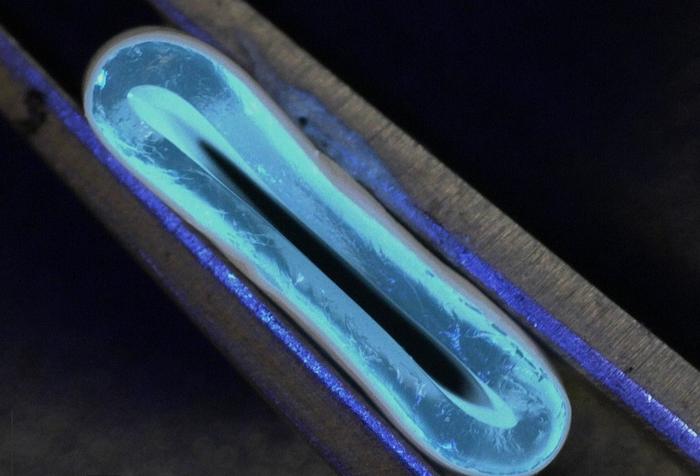Artificial blood vessels could improve heart bypass outcomes

Credit: Dr Norbert Radasci, School of Engineering, University of Edinburgh.
Artificial blood vessels could improve heart bypass outcomes
3D-printed blood vessels, which closely mimic the properties of human veins, could transform the treatment of cardiovascular diseases.
Strong, flexible, gel-like tubes – created using a novel 3D printing technology – could improve outcomes for heart bypass patients by replacing the human and synthetic veins currently used in surgery to re-route blood flow, experts say.
The development of synthetic vessels could help limit scarring, pain and infection risk associated with the removal of human veins in bypass operations of which some 20,000 are carried out in England each year. The products could also help alleviate the failure of small synthetic grafts, which can be hard to integrate into the body.
In a two-stage process, a team of researchers led by the University of Edinburgh’s School of Engineering used a rotating spindle integrated into a 3D printer to print tubular grafts made from a water-based gel.
They subsequently reinforced the printed graft in a process known as electrospinning, which uses high voltage to draw out very thin nanofibers, coating the artificial blood vessel in biodegradable polyester molecules.
Tests showed the resulting products to be as strong as natural blood vessels.
The 3D graft can be made in thicknesses from 1 to 40 mm in diameter, for a range of applications, and its flexibility means that it could easily be integrated into the human body, the team says.
The next stage of the study will involve researching the use of the blood vessels in animals, in collaboration with the University of Edinburgh’s Roslin Institute, followed by trials in humans.
The research, published in Advanced Materials Technologies, was carried out in collaboration with Heriot-Watt University.
Dr Faraz Fazal, of the University of Edinburgh’s School of Engineering and lead author, said: “Our hybrid technique opens up new and exciting possibilities for the fabrication of tubular constructs in tissue engineering.”
Dr Norbert Radacsi, of the University of Edinburgh’s School of Engineering and principal investigator, said: “The results from our research address a long-standing challenge in the field of vascular tissue engineering – to produce a conduit that has similar biomechanical properties to that of human veins.
“With continued support and collaboration, the vision of improved treatment options for patients with cardiovascular disease could become a reality.”
For further information please contact: Rhona Crawford, Press and PR Office, tel 07876 391498, email Rhona.Crawford@ed.ac.uk
Journal
Advanced Materials Technologies
Method of Research
Experimental study
Subject of Research
Lab-produced tissue samples
Article Title
Fabrication of a Compliant Vascular Graft Using Extrusion Printing and Electrospinning Technique
Article Publication Date
25-Jul-2024



